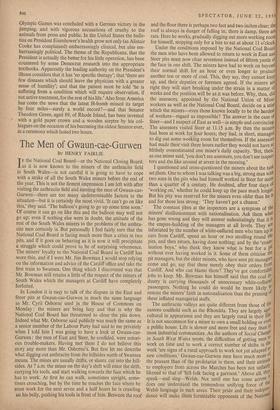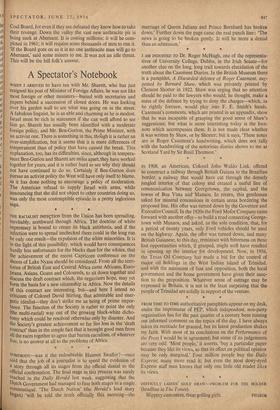The Men of Gwaun-cae-Gurwen
BY HENRY FAIRLIE
IF the National Coal Board—or the National Closing Board, as it is now known to the miners of the anthracite field in South Wales—is not careful it is going to have to cope with a strike of all the South Wales miners before the end of the year. This is not the firmest impression I am left with after visiting the anthracite field and meeting the men of Gwaun-cae- Gurwen—there are too many undeterminable factors in the situation—but it is certainly the most vivid. 'It can't go on like this,' they said. 'The balloon's going to go up some time soon.' Of course it can go on like this and the balloon may well not go up; even if nothing else were in doubt, the attitude of the rest of the South Wales miners to the problems of the anthra- cite men certainly is: But personally I feel fairly sure that the National Coal Board is facing much more than a crisis in two pits, and if it goes on behaving as it is now it will precipitate a struggle which could prove to be of surprising vehemence. The miners' loyalty to the National Coal Board in Cardiff has worn thin, and if I were Mr. Jim Bowman I would stop relying on the information and advice of the Cardiff office and take the first train to Swansea. One thing which I discovered was that Mr. Bowman still retains a little of the respect of the miners of South Wales which the managers at Cardiff have completely forfeited.
In London it is easy to talk of the dispute in the East and Steer pits at Gwaun-cae-Gurwen in much the same language as Mr. Cyril Osborne used in the House of Commons on Monday : the miners are being lazy and that is why the National Coal hoard has threatened to close' the pits down. Indeed what Mr. Osborne said publicly was much the same as a senior member of the Labour Party had said to me privately when I told him I was going to have a look at Gwaun-cae- Gurwen : the men of East and Steer, he confided, were notori- ous trouble-makers. Having met them I do not believe this story any more than Mr. Osborne's. But first let me describe what digging out anthracite from the hillsides north of Swansea means. The mines are usually drifts, or slants, cut into the hill- sides. At 7 a.m. the miner on the day's shift will enter the drift, carrying his tools, and start walking towards the face which he has to work. At first he can walk, sometimes upright, some- times crouching, but by the time he reaches the face where he must work for the next seven and a half hours he is crawling on his belly, pushing his tools in front of him. Between the roof and the floor there is perhaps two feet and two inches clear; the root is always in danger of falling in; there is damp, there are rats. Here he works, gradually digging out more working room for himself, stopping only for a bite to eat at about 11 o'clock. Under the conditions imposed by the National Coal Board the men who have been allowed to return to work in East and Steer pits must now clear seventeen instead of fifteen yards of the 'face in one shift. The miners have had to work on beyond their normal shift for an hour or even longer to produce another ton or more of coal. This, they say, they cannot keep up, and their deputies or foremen agreed. If the miners are right they will start breaking under the strain in a matter of weeks and the position will be as it was before. Why, then, did the assessors, appointed by the National Union of Mine• workers as well as the National Coal Board, decide on a stint which the miners—even those known locally to be the hardest of workers—regard as impossible? The answer in the case of Steer—and I suspect of East as well—is simple and convincing. The assessors visited Steer at 11.15 a.m. By then the miners had been at work for four hours; they had, in short, managed to dig out some working room for themselves. If the assessors had made their visit three hours earlier they would not have se, blithely overestimated one miner's daily capacity. 'But, then, as one miner said, 'you don't see assessors, you don't see inspec' tors and the like around at seven in the morning.' I questioned and cross-questioned the miners about the task set them. One to whom I was talking was a big, strong man with two sons in the pits who had himself worked in Steer for more, than a quarter of a century. He doubted, after four days 01 `working on,' whether he could keep up the pace much longer' But his pity was reserved for the miners even older than he is and for those less strong : 'They haven't got a chance.'
The constant jibes at the inspectors are a symptom of the miners' disillusionment with nationalisation. Ask them what has gone wrong and they will answer unhesitatingly that it i5 the empire-building of the managers at all levels. They an infuriated by the number of white-collared men who turn up i° cars from Cardiff, spend an hour or two strolling round the pits, and then return, having done nothing; and by the ‘`exany ination boys,' who think they know what is best for a Pit without ever having worked in it. Some of them criticise rile pit managers, but the older miners, who have seen pit managers come and go, say that these merely obey their orders from Cardiff. And who can blame them? They've got comfortable jobs to keep. Mr. Bowman has himself said that the coal ill; dustry is carrying thousands of unnecessary white-collared passengers. Nothing he could do would be more likely restore the miners' faith in nationalisation than the pruning of these inflated managerial staffs. The anthracite valleys are quite different from those of the eastern coalfield such as the Rhondda. They are largely age"' cultural in appearance and they are largely rural in their life' It is not uncommon for a miner to own a small holding or eveen a public house. Life is slower and more free and easy than most industrial communities. As the authors of Social Chang' in South West Wales wrote, the difficulties of getting men I°. work on time and to work a correct number of shifts in tile week 'are signs of a rural approach to work not yet adapted _ new conditions.' Gwaun-cae-Gurwen men have much more 0" the peasant, than of the proletariat in them, and their attitude to employers from across the Marches has been not unfairlY, likened to that of 'hill folk facing a garrison.' Above all, tile speak—and sing—Welsh. Not until one has come across 1t does one understand the tremendous unifying force of r11' Welsh language in such areas. Their pride and their indepei dence will make them formidable opponents of the Natio° Coal Board, for even if they are defeated they know how.to take their revenge. Down the valley the vast new anthracite pit is being sunk at Abernant. It is costing millions; it will be com- pleted in 1961; it will require some thousands of men to run it. 'If the Board goes on as it is no one anthracite man will go to Abernant,' said some miners to me. It was not an idle threat. This will be the hill folk's answer.



































 Previous page
Previous page